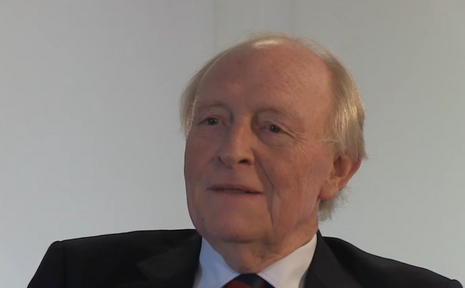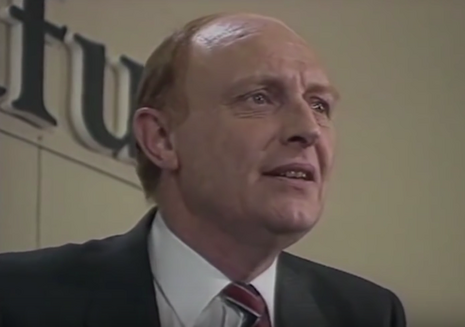Lord Kinnock: ‘I’m too old to be angry’
Alastair Holder Ross and Joel Nelson talk to the former Leader of the Labour Party, about Blair, Thatcher and Major

We meet Neil Kinnock in the Houses of Parliament on the day of the House of Lords debate on the triggering of Article 50. The former Leader of the Labour Party, who turns 75 this year, energetically guides us out of the Palace of Westminster, stopping to joke with other members of the Upper House, before steering us across Westminster Green to his office. He talks all the way – on Brexit, on the Lords debate and on the Labour Party.
We sit down in his office, lined with books charting the history of the Labour movement and adorned with cartoons from thirty years of national prominence, for a marathon three-hour conversation, which covers almost every issue of national importance.
Article 50 is clearly on Lord Kinnock’s mind, and he launches into a diatribe against the government’s negotiating position as soon as we are comfortable. As a former European Union Commissioner and the man who changed the Labour Party’s stance on membership, he is understandably exercised by the prospect of Brexit.
“In one or two other areas of politics the only thing keeping me from despair is anger”
Kinnock is scathing of the government’s strategy, criticising it both for the weakness of its negotiating strategy and for the folly, as he sees it, of setting a concrete date for the triggering of Article 50. You should never, he insisted, set an end date prior to the start of negotiations.
“The clock’s ticking,” he tells us, “and the government took no account of the fact the French, the Dutch and the Germans are for most of this year not going to be giving a damn about Brexit, except in so far as it impinges on their own elections and their own audiences. But no account seems to have been taken of that.”
He continues in this vein, complaining that to “finalise it all, [the government] say that if we don’t like the deal they’ll walk away. You never do that in negotiations,” he declares, thumping the table.
“You may internally be determined that if you don’t get what you want you will walk away. There is a day for slamming the door. But you never express that out loud.”
We spend a long time talking about the Brexit strategy but it is while pondering the slogan ‘Take Back Control’ that Kinnock becomes particularly animated. He asks us “is that what they thought a 17 per cent devaluation of our currency was? Is that what they think the suspension or withdrawal of £65 billion worth of investment decisions within months of June 23rd actually amounted to?”
Clearly Kinnock feels passionately about these issues and has thought deeply about them. Why, we wonder, has he not spoken out, as Tony Blair has done? He chuckles, before declaring that “there’s no reason why the general public should take much interest in this old warhorse. And I say that without false modesty – it’s a reality – but anybody who wants to know knows damn well where I stand.”
The conversation turns to the Labour Party, and its willingness to back the government on Brexit. He tells us, frankly, that “the broad Labour consideration was that we cannot afford to rebuff the majority decision of the referendum because we have got to restore our conversation with the British public and regain our permission to speak and be heard. Our emphasis has got to be not on whether Britain had voted to leave but how we leave. What are the terms and conditions of our trade and economic relations, consumer and environmental standards and the freedom of people to live and work?”
It is while pondering the wider implications of the Brexit vote that strong emotion creeps into Kinnock’s speech. A note of sadness enters his voice as he confesses, “it makes me depressed but also furious. In fact in many ways not only in this score but in one or two other areas of politics the only thing keeping me from despair is anger.” Conscious that this could seem melodramatic, he regains his composure. “But anyway,” he murmurs, “I’m too old to be angry”.
“The government took no account of the fact the French, the Dutch and the Germans are for most of this year not going to be giving a damn about Brexit”
He is sure that, “if we put all the emphasis on that, then we will get heard because our concerns are rational and to do with the wellbeing of families and communities and workers throughout the country.”
“Here’s the problem”, Kinnock tells us. “That the Leader of the Labour Party has shown that he doesn’t really comprehend the political situation produced by the Brexit vote and against the background of, let us say, modified commitment to remaining in the European Union is very unsure about any judgments being made.
“So instead of articulating, if you like, this dual track of making clear that we weren’t going to impede the outcome of the result but, at the same time, saying it’s how we leave that’s absolutely vital for the well-being of the British people and there is our focus, the second message got lost and the result is the situation, the maelstrom, that we see now.”

He is clear how the Leader of the Opposition should have behaved, explaining that “what Jeremy Corbyn should have done a few weeks ago is to say the country is divided, opinion is divided, members of parliament have a duty to understand and respect the opinions of their constituents, we will therefore have a free vote. And [he should have] said, literally in the same paragraph, our priority and utter focus is on the conditions under which we will leave and the future of our country can be secure. Now if that had happened the basis of the debate would have shifted.”
But, we say, surely that would have just exacerbated the splits within the party. Lord Kinnock brushes such concerns aside. “I think that it would have made it more difficult for the government to try to get away with it. First, let us remember, [it's been done] with no meaningful consultation of parliament. I mean, turning up and making statements and appearances is fine but that hardly amounts to stringent democratic accountability.”
Our conversation moves on to those leaders of the Labour Party who succeeded Kinnock: Smith, Blair, Brown, Miliband and Corbyn. Did he advise them, we asked?
“No. Advised is probably overstating it,” he tells us. He “had regular chats with them but advice is what is taken! No I haven’t had a chat to Jeremy.”
And has Corbyn, we ask, retreated into a bunker, as many press reports suggest? Kinnock pauses before replying that “there seems to be a lot of that. There’s no gauge for it. There’s no guide to relative political introversion,” he laughs, before telling us of the resignation of a talented member of the leader’s staff. “When you’ve got people like that leaving,” he tells us, shaking his head, and the thought trails off. On Corbyn more generally he notes that “action is confined to speaking to rallies. Perhaps that’s where Trump got the idea from, but at least he won an election first!”
Though acknowledging that there are difficulties in the Labour Party, Kinnock has little time for the argument that the Left is moribund. “It’s a point you could have made at just about any time, including the eighties and certainly the fifties and the thirties,” he tells us, springing up to grab Essays on Equality by R. H. Tawney, the pioneer of Ethical Socialism, which proves his point.
Does he, though, believe that the Labour Party will survive in its current form? On this point Kinnock is unequivocal: “Oh yes, God, yes.”
As the conversation draws to a close, we turn to Kinnock’s encounters with some of the giants of 20th century history: Reagan, Thatcher, Gorbachev, and the man whom Kinnock has been influenced most profoundly by, Nye Bevan. It does not take much asking to get Kinnock to give a wistful account of his memories of such figures.
“I met Reagan twice, I remembered both I think he only remembered one because the second time I met him he was really out of it”
His memories of Mrs Thatcher, who he faced across the dispatch box for seven years, are more qualified. He recalls that, just after he was elected leader, “I talked to Jim Callaghan about what the conventions were of relationships between the Opposition and the Prime Minister and he said, ‘well, I can tell you what the conventions are, but I can also tell you that Mrs Thatcher is a difficult woman. Not difficult in an aggressive sense, as somebody who will outbox you, but just difficult’”.
He continues: “I said to him, ‘in other words, if your ball went to her garden you wouldn’t knock on the door to ask for it back’. And he said ‘you’re absolutely right, that’s exactly it!’ And that was true, and it wasn’t until I’d then encountered Major as prime minister that I realized what the relationship productively was supposed to be.”
When we ask him to tell us about Ronald Reagan, he is measured, recalling that “I met Reagan twice. I remembered both; I think he only remembered one, because the second time I met him he was really out of it, poor sod. I don’t know what it was – they had given him little prompter cards cut into the shape of the palm of his hand for him to hold, and I thought, ‘that’s ok doing that with the Leader of the Labour Party. I hope to Christ he doesn’t go into any nuclear negotiations like that.’”
Our conversation finishes with another impassioned reading of R. H. Tawney and a kind invitation to stick around in his office to watch the House of Lords debate on television
 News / Eight Cambridge researchers awarded €17m in ERC research grants27 December 2025
News / Eight Cambridge researchers awarded €17m in ERC research grants27 December 2025 News / News in Brief: carols, card games, and canine calamities28 December 2025
News / News in Brief: carols, card games, and canine calamities28 December 2025 News / Caius mourns its tree-mendous loss23 December 2025
News / Caius mourns its tree-mendous loss23 December 2025 News / Clare Hall spent over £500k opposing busway 24 December 2025
News / Clare Hall spent over £500k opposing busway 24 December 2025 Interviews / Meet Juan Michel, Cambridge’s multilingual musician29 December 2025
Interviews / Meet Juan Michel, Cambridge’s multilingual musician29 December 2025








